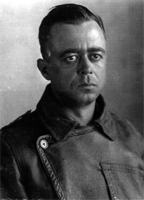Capt. Solomon Lee Van Meter
was enshrined in 2001
was enshrined in 2001

This Lexington native was a successful farmer, inventor and businessman. Between 1910 and 1916 he invented several parachute devices for saving aviators' lives, receiving patents in 1916. Entering the US Army in 1917, he was assigned to Aviation Section, Signal Corps, Kelly Field, Texas, for flight training and was rated as pursuit pilot. Assigned thereafter to McCook Field, Dayton, Ohio, to continue experimental work in parachute development. Inexplicably, he was not allowed by superiors to participate in the refinement of equipment for which he already held patents. The most important of these patents was for the design of the first chute to be packed into a container and strapped to the back of the aviator, so it could be manually deployed using a ripcord - the same basic design in use today. Other designs included ejection seat-type devices that led to some of the systems in use today.
In July 1921, he participated as a bomber pilot in the historic demonstration led by Gen. Billy Mitchell off Virginia's coast. Several captured German WWI warships were easily sunk, demonstrating their vulnerability to bombs. Van Meter was credited with outstanding achievement after scoring a direct hit, sinking of a destroyer. These demonstrations showed the effectiveness of aerial bombing and changed the course of modern warfare.
Returning to Lexington in 1928 after retirement from the Air Force, Solomon Van Meter continued to work on his many inventions. Ironically (and appropriately), Van Meter was finally able after retirement from the USAAC to file a civilian lawsuit against the U.S. Government and the Irving Air Chute Company for infringement and unlicensed use of his patent. In 1930, a New York U.S. District Court rendered a judgment that his patent (No., 1,192,479) Dated 7/25/16, was valid and had indeed been infringed. Appropriately, in 1932 the U.S. 68th Congress passed a special act (Private No. 271) giving him substantial monetary compensation for his invention which had already saved many hundreds of lives.
Solomon Van Meter died on November 3, 1937.
